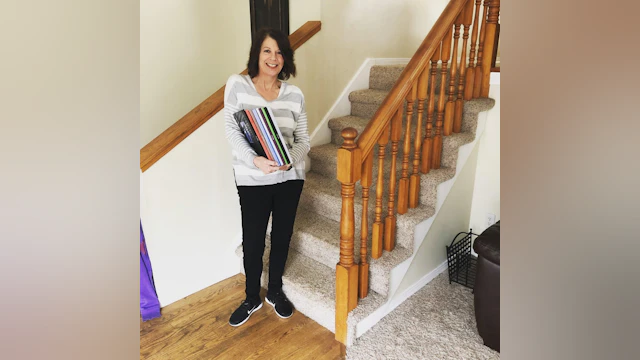Jul. 30, 2019- The period between Easter and the first week of May is always tough for me. The season brings the sights, smells and sounds that take me back to what was, without question, the saddest time in my life. Although two of my five children were born in this season, bringing tremendous joy, there is an undeniable melancholy that hangs next to me during this time, because it is also the season in which I lost my dad to suicide, nearly 30 years ago.
I was 19.
My dad was a firefighter, so he was home a lot as I grew up, two days out of every three. He was a quiet man, introspective, but his work centered on serving others. Although I wouldn’t have been able to articulate it back then, I now understand how much he contributed to my emotional well-being. He loved me. For him, my very existence was enough. I didn’t have to do a single thing.
When he died, I had been away at college for two years. I didn’t know anything about depression. While I was aware that he faced some challenges, I had no idea how seriously he had been struggling. Shock and profound loneliness swept over me in response to his death. Never had I felt so completely alone.
I returned home to help with the arrangements. It was important to me that I speak at his memorial service. I was the person closest to him; I would give him voice one last time. Afterward, I returned to school, as I knew he would want me to, determined to achieve my goals.
At first, I threw myself into my studies, hesitant to talk about him, and afraid people would judge him or think he was weak if they knew he had died by suicide. As time passed and I began to sense that very judgment when I did tell people, it became my mission to prove otherwise. I’m still on that mission.
People don’t like to talk about suicide. They don’t even like to think about it. Mere mention of the word makes folks uncomfortable. But if we never think about it and never talk about it, how can we make any progress toward preventing it?
When someone we love dies by suicide, our natural reaction is to try to figure out why. We so desperately wish to answer that question that we search, sometimes obsessively, but always unsuccessfully, to understand. We want it to make sense. But suicide is not rational, and in most cases, partially the consequence of an undiagnosed or undertreated mental health condition, which is one of the common risk factors associated with suicide.
Attempting to explain an irrational act in rational terms will always be futile. It’s no different than asking ourselves after a loved one dies of some other disease, “Why did he get cancer?” or “Why did she get heart disease?”
Why did my dad die by suicide? Why did your loved one? Because they were ill.
Today, with treatment such as therapy and/or effective medication, depression can often be successfully managed. But 30 years ago? We barely dared mention mental health issues.
The second thing I’ve learned is not to place blame. If only he had done this or she hadn’t done that, maybe this wouldn’t have happened. Or, sometimes we focus inward, blaming ourselves. If only I had been a better daughter or son or spouse or friend. But no one is to blame. Depression is a disease. Blaming others or ourselves is not only unproductive; it’s ridiculous.
Victims of suicide are just that, victims. There’s a stereotype of suicide victims that they are flawed somehow: that they are bad, or weak, or even selfish. Perhaps they didn’t care about their families or value those close to them. Perhaps they weren’t strong enough to face the trials of life like the rest of us do, or maybe they were just evil and desired to inflict pain. No. No. No. And no! They were ill. Some people feel that because the act of suicide seemed deliberate or even planned out, that the victims knew what they were doing and are, therefore, responsible. But the act of suicide, planned or not, is one of an individual suffering from a very real and biological disease. Is it all in their heads? Yep! The brain is an organ. Mental health is just as real as physical health.
As a suicide loss survivor, I have serious trust issues. On a deep level, because of my experience, I know that in an instant, the whole world can come crumbling down around me, because it once did. I tend to worry more than most people. I worry about my family, my friends. But I move forward in faith, doing my best, secure in the knowledge that our experiences, even the sad ones, can help us grow.
Today marks yet another anniversary of my dad’s death. As usual, the season has been filled with thoughts of him, memories so joyous and ultimately so sad. I loved him very much. If I got to choose, would I have wished to experience the suicide of someone so close to me? Not in a million years! The pain was like no other. But…since that is the hand I was dealt, I’m grateful for the insight it has given me about an illness so vastly misunderstood.
All those years ago, as I first began processing my father’s loss, I had no idea how long and painstaking, yet beautifully transformative, my healing path would be. I’m definitely still on that path. I expect it will be a lifelong process. And that is okay.
